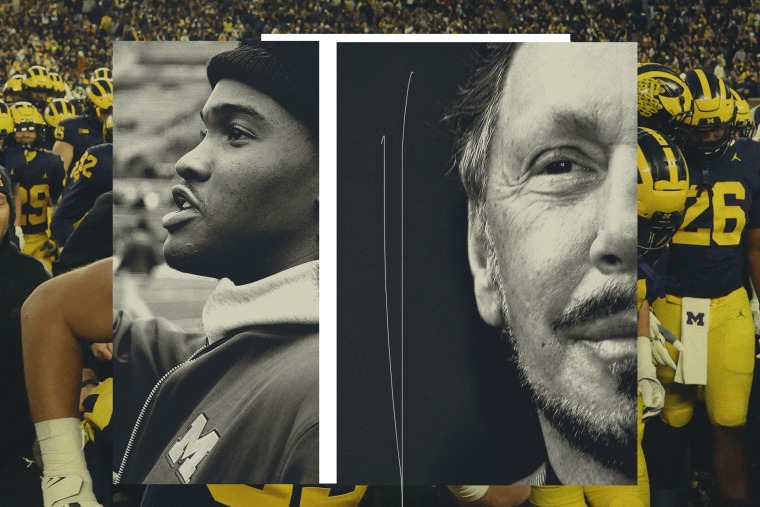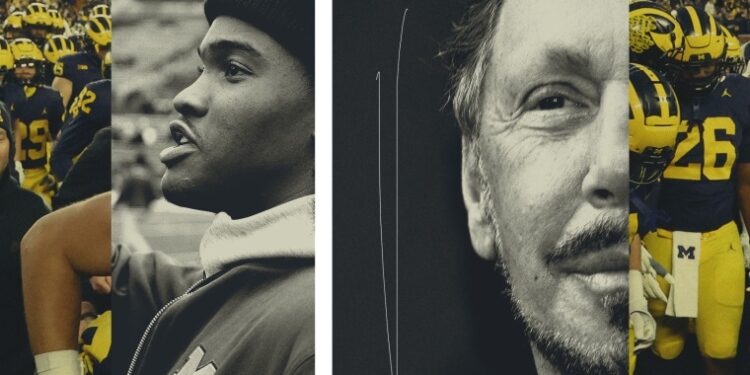Israel delays vote to approve Gaza ceasefire after officials announced a deal. President Joe Biden warns that the U.S. is developing an oligarchy in his farewell speech. Plus, how a billionaire’s role in helping recruit a coveted quarterback to Michigan parallels the political landscape.
Here’s what to know today.
Israel delays ceasefire vote; Hamas says it is committed to deal
A ceasefire deal between Israel and Hamas was announced yesterday, which would end 15 months of fighting in the Gaza Strip and free dozens of hostages held there. However, this morning clashes emerged over the final details, delaying an Israeli vote to approve the deal.
After planning to vote today, Israel has said that its cabinet will not meet to approve the deal with Hamas, claiming the militant group was creating a “last-minute crisis.” This morning, Hamas said it was “committed to the ceasefire agreement, which was announced by the mediators.”
Prime Minister Benjamin Netanyahu’s office did not elaborate on the detail of the claimed issue. Far-right Israeli officials have expressed strong opposition to the ceasefire deal.
According to Qatar’s prime minister and foreign minister, Sheikh Mohammed bin Abdulrahman Al Thani, whose country hosted months of intense negotiations, the deal would be a phased agreement that would see Israeli forces withdraw to the Gaza border. Palestinians would then be able to return to their homes, and humanitarian aid would be shipped to the enclave and hospitals and health care centers would be rebuilt, he said.
Under the first phase of the deal, Hamas is expected to gradually release a total of 33 of the 96 hostages who remain held in Gaza after being taken captive on Oct. 7. A senior U.S. administration official said two Americans would be among the first hostages released. Israel will also release 1,000 Palestinian prisoners who were not involved in the Oct. 7 attacks, and an unspecified number of Palestinian prisoners will also be released abroad or in Gaza.
The war has shattered Gaza’s infrastructure and displaced most of its population. Health officials in the enclave said more than 46,000 Palestinians have been killed by Israeli forces.
This is Morning Rundown, a weekday newsletter to start your day. Sign up here to get it in your inbox.
Biden bids farewell with a series of warnings
With less than a week left in office, President Joe Biden said farewell to the nation with a speech in the Oval Office. After celebrating some of his key accomplishments while in office, Biden offered a series of warnings about threats to American democracy, including a rising “oligarchy taking shape.”
The so-called oligarchy, which seemed clearly aimed at billionaire Elon Musk and Meta CEO Mark Zuckerberg, is one of “extreme wealth, power and influence that literally threatens our entire democracy, our basic rights and freedoms, and a fair shot for everyone to get ahead,” Biden said. The president also warned of “the potential rise of a tech industrial complex,” criticized social media platforms for “giving up on fact-checking” and argued for safeguards on artificial intelligence. Biden also took some swipes at Donald Trump, though he never referred to the president-elect by name.
Biden also used his speech to highlight the ceasefire deal between Israel and Hamas and other key accomplishments like persistent job growth, lower prescription drug costs and investments in clean energy to fight climate change. Serving as president, he said, has been “the highest honor of my life.”
More politics news:
- Six of Trump’s big-office nominees faced hearings yesterday, including Pam Bondi for attorney general, Marco Rubio for secretary of state and John Ratcliffe for CIA director. Here are seven takeaways from them.
- Today, there are confirmation hearings for Doug Burgum, Trump’s pick to lead the Interior Department; Lee Zeldin EPA administrator; Eric Scott Turner for secretary of housing and urban development; and more. Follow our live blog for updates throughout the day.
- Rudy Giuliani is set to be back in court today as a trial to determine the fate some of his most valuable assets — his Florida condo and New York Yankees World Series rings — kicks off.
- The Biden administration is considering ways to keep TikTok available in the U.S., should a ban on the app take effect Sunday.
- Speaker Mike Johnson removed Republican Rep. Mike Turner as chairman of the House Intelligence Committee.
- Vivek Ramaswamy, who is slated to work alongside Elon Musk to help cut government spending during Trump’s term, is in discussions about filling Vice President-elect JD Vance’s Senate seat in Ohio, two sources said.
- President Trump made several promises during his presidential campaign about what he would do on his first day in office. Here’s a list.
- Former presidents Obama, Clinton and Bush will not attend Trump’s traditional inaugural lunch.
L.A. faces a long road to rebuilding
The road to recovery for Los Angeles-area communities ravaged by the recent wildfires will be a yearslong process. Just ask Mayor Steve Crowder, whose community of Paradise, California, saw one of the worst wildfires in state history. In 2018, 90% of the town was destroyed and the population was reduced to 2,000 people. Six years later, the city is constructing around 500 homes a year, and its population is up to 11,000 people, Crowder said. One silver lining is that the city has been rebuilt with more modern infrastructure and buildings that will be more resilient to future fires.
L.A. is just at the beginning of that journey. It can take weeks before residents are able to check on their properties and more than a year before all the debris and hazardous materials are removed. It could be several more years before water systems, power lines, roads and schools are fully rebuilt, with funding fights in Washington potentially causing delays. And for fire victims, it’s possible that insurance won’t cover the full cost of rebuilding, as Crowder observed in Paradise. Read the full story here.
Southern California is now getting a break from fierce Santa Ana winds that had threatened the region this week. While strong winds are set to return next week, the National Weather Service said they won’t be as strong as when the fires broke out. As of last night, the Palisades Fire was at 23,713 acres and 21% contained, and the Eaton Fire was at 14,117 acres and 45% contained.
More coverage of the L.A. wildfires:
- Fire officials pinpointed the start of the Eaton Fire to an area in the foothills above Altadena, fueling speculation over whether a high-voltage transmission tower is to blame.
- What is the pink powder sprayed over wildfires? It’s called Phos-Check, and there’s a reason for its bright hue.
- One reason last week’s collision between a drone and a “Super Scooper” firefighting plane caused such a stir was that L.A. doesn’t have many spares to take its place. Here’s what to know about the plane that’s so “rugged” and “reliable” that its design has barely changed in 55 years.
The transition away from Red No. 3
Say goodbye to Red No. 3, the synthetic dye that gives food and drinks their bright red cherry color. Yesterday, the FDA announced a ban over the dye’s link to cancer in animals. Red No. 3 is still used in more than 9,200 food items, like candy, cereals, cherries in fruit cocktails and strawberry-flavored milkshakes, according to the Center for Science in the Public Interest.
Food safety advocates said they don’t anticipate any hiccups in quickly removing products with the artificial dye from grocery shelves. A big reason: Red No. 3 has long been banned in the European Union and some other countries, meaning many companies already sell products overseas that they can easily produce for American consumers. And last year, California became the first state to ban the dye. While the law wasn’t set to take effect until 2027, there were expectations its effect could be seen sooner.
So how will red foods retain their bright color? One way is through natural alternatives like beet or pomegranate juice. There’s also a possibility that some manufacturers may simply swap Red No. 3 for Red 40, another dye that is associated with separate health concerns.
Read All About It
- The FDA has proposed a drastic reduction in the level of nicotine in cigarettes.
- Meta’s recent policy changes, seen as a shift to the right, has sparked boycotts and a user exodus from Facebook, Instagram and WhatsApp.
- “Drug-addicted rats” are eating narcotics seized and stored at police headquarters in downtown Houston, prompting a change to how long evidence is stored.
- American “TikTok refugees” are getting a warm welcome on Chinese social media platform RedNote.
Staff Pick: Politics, pocketbooks and college football

I may write about politics and campaign finance for a living, but I’m a huge sports fan. And when I heard the news that billionaire Larry Ellison partially bankrolled the deal that helped flip a prized quarterback recruit to Michigan, it dawned on me: The new world order in college football — the NIL collectives and the ability for a rich donor to have such influence — looks just like the rise of super PACs that changed the game for money in politics. Having a megadonor in your corner to entice the nation’s best recruit will be a massive boon for Michigan and anyone else who is able to follow suit. But politics provides an important warning: It’s not just about the money, as the presidential candidate who spent the most lost two of the last three elections. — Ben Kamisar, national political reporter
NBC Select: Online Shopping, Simplified
Having trouble learning a new language? An NBC Select reporter spent six weeks trying different language-learning apps to find out how they all stack up. Plus, board-certified dermatologists recommend the best shampoo for babies with sensitive skin.
Sign up to The Selection newsletter for hands-on product reviews, expert shopping tips and a look at the best deals and sales each week.
Thanks for reading today’s Morning Rundown. Today’s newsletter was curated for you by Elizabeth Robinson. If you’re a fan, please send a link to your family and friends. They can sign up here.






